When frequent Box reader and occasional poster Dan Julien mentioned this paper in the Roundup the other day, I asked him to share it. Part of a research project in his Quantitative Analysis course at Brock University, it considers the effect of a free agent’s departure on fan attendance, specifically Carlos Delgado from Toronto.
His professor is an academic not-for-profit type who doesn't follow sports. That's why he uses only VORP, defining it "so that a two year old would understand it." Note that 30 surveys were collected and the inputs multiplied by seven, so the students wouldn't waste days harassing people and then putting together the results. The main part of the exercise was to build a survey that could test variables and could be well understood.
Thanks for submitting this to Batter's Box, Dan. Continued success with your studies.
Free Agency And Attendance
by Dan Julien
December 7, 2004
One of the difficulties of managing any organization is finding the right people to perform the tasks that need to be completed while not exceeding a budget. On professional sport teams this often involves a general manager making difficult decisions about trades or signings to complete his roster.
This study set out to study the impact that one of these decisions would have on the fans of a sports team. The decision in question was Toronto Blue Jays’ general manager, J.P. Ricciardi choosing to re-sign or not his all star first baseman Carlos Delgado. Although Ricciardi has made it clear that he would like to retain Delgado’s services, his budget for the upcoming season may not allow him to do so.
Carlos Delgado has become a fan favorite because of his length of stay with the franchise and his performance, therefore it would make sense to believe that his departure could negatively affect fan loyalty. The purpose of this survey design was to test the relation between fan attendance and the departure of a star player in Major League Baseball. More accurately, the study wanted to help the Jays understand the impact of the possible departure of their star first baseman will have on attendance and revenues so that they could confidently take a decision on how much he would be worth to the franchise.
The independent variable fan attendance was generally defined as the departure, via free agency, of Carlos Delgado from the Toronto franchise to another franchise within Major League Baseball.) The dependent variable was generally defined as the amount of spectators that will come to Jays games during the 2005 Major League Baseball season.
METHODS
This research was conducted with a survey to collect the information we would like from fans of the Toronto Blue Jays. The decision to go for a survey was two-fold; I wanted to understand the characteristics of our sample as well as obtaining information about their behavior towards the Blue Jays.
To answer the second question of the research I decided to go with archival research into baseball statistics to understand Delgado’s statistical importance to the ball club. To access these statistics, we used the Baseball Prospectus website www.baseballprospectus.com and mainly the “Value Over Replacement Player” (VORP) statistic. According to Baseball Prospectus(2004), VORP is the calculation of a certain player’s importance to the team over a player of replacement level.
The population for our sample was Toronto Blue Jays ticket-package holders, although these people are not the only Jays fans, they are the ones who have made a commitment to the team by purchasing ticket-packages. The Toronto Blue Jays were nice enough to have provided us with list of package holders who had accepted to be contacted by the team and outside sources when signing up for the packages. I only sent surveys to one fifth of the list and will choose these people by random selection.
The first type of information I collected is demographic data; such as age and gender. After, the survey asked respondents questions relating to their level of fandom of the Blue Jays and of baseball in general. Finally, the survey inquired about the fans’ expectations of the Blue Jays if Delgado does depart as a free agent and their resulting purchasing decision. This survey was sent via mail to the respondents’ homes with a self-addressed, postage-paid envelope enclosed.
The object of the first three questions of the survey was to gather personal data about the participants so that they could be classified in demographic groups. The questions numbered 4 through 8 helped gather information about the independent variable, fan behavior. The next two questions, 9 and 10, were to help understand the importance that participants think that Delgado has for the team, to help us understand the effect of the independent variable which is the possible departure of Delgado. Finally, the 11th and 12th questions were asked to measure the effect of the independent variable on the dependent variable by seeing if attendance and television viewership of Blue Jays’ games would decrease as a result of Delgado leaving.
The data collected with the 11th and 12th question has allowed me to measure the estimated impact that Carlos Delgado’s departure would have on the Blue Jays’ attendance. A further study at the end of the season using the attendance data could evaluate this further but this data would be skewed by other factors such as team success and the popularity of baseball in the wake of the National Hockey League lockout. As for the question of Delgado’s statistical significance, as previously mentioned has been dissected with the help of statistics from the Baseball Prospectus website, such as the Value Over Replacement Player. I have examined the value that Delgado has over a replacement level player and then examine what changes the Blue Jays could make with the estimated salary that they would have to pay him that could help make up or even improve the lineup with this change at first base.
To analyze the data, I used the SPSS program, allowing me to input the data and run different tests on it to identify the valued data for the research such as the descriptive statistics that helped shape an understanding of the population characteristics. Also, the program helped me identify other important data such as the connection between level of fanhood and the possible decrease in games watched and attended because of Delgado’s departure. For the statistical significance section, the collection of the VORP statistic was essential and then a review of the players available through free agency and trade rumours involving the Blue Jays was completed through ESPN.com. The players identified were then matched up to the Blue Jays depth chart and the players who they replaced were also identified. The VORP statistics for all players identified roster were then calculated by hand to come up with the data to show the changes that could be made to off-set the departure of the player in question.
RESULTS
SURVEY ANALYSIS
Out of the 500 surveys sent out, 210 respondents completed the survey in its entirety and sent them back to me. The results identified in this section are provided with a margin of error of 10% because of the relatively small sample size at a 95% confidence level.
For this research, there were 210 respondents to the mail survey administered. Of these 210 respondents, half the participants were between the ages of 26-40 while the average age for subjects that completed the survey was 32.90 years of age. As for the question of gender, of the 210 subjects 63.3%, 133 respondents, were male. Below is a bar chart showing the breakdown age breakdown along with a pie chart displaying the gender of subjects:
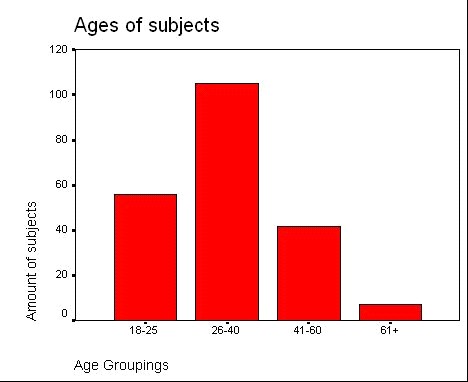
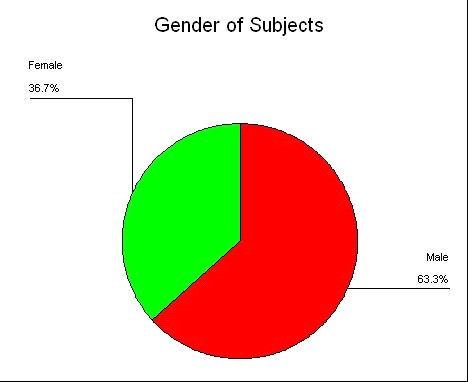
As for marital status, 40% of the subjects were married while 23.3% were divorced and 16.7% were single. The answers for the self classification of Blue Jay fanhood were varied with the four of the choices over 20%, but the most found answer was “casual fan” of which 26.7% of respondents claimed being. Here is a pie chart that presents this data:
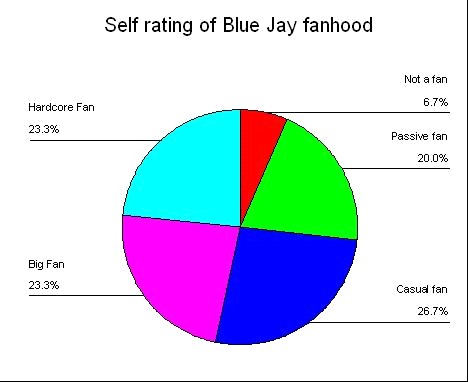
The respondents were overwhelming in their identification Carlos Delgado as being either Important, of Great Importance or Very Important to the Toronto Blue Jays by identifying one of these categories 83.3% of the time. Although this number was staggering and impossible to ignore, only a third of the respondents said that they would watch less games and only 20% claimed that they would attend less games if Carlos Delgado was to depart. Also, fans speculated that the Jays would lose more games than if Delgado was in the line-up next season 76.7% of the times with a third of the total answers being that the Jays would lose 1 to 4 more games. The following is a pie chart identifying fan views on the change in games won without Delgado:
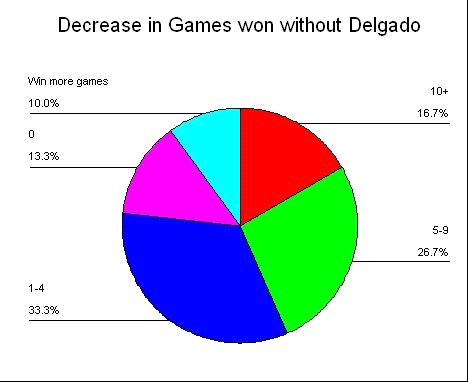
The information reported above is important for the Blue Jays front office to review and I wanted to give them more in-depth information to identify exactly who it was that would attend less games and watch less games on television. Because management would be interested in their top fans, we cross-tabulated the data of Blue Jays fanhood with the answers to the questions about the importance of Carlos Delgado along with the amount of games watched on television and attended less than if Delgado was re-signed. In the following three tables, this data is presented:
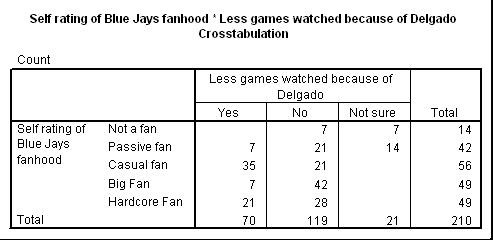
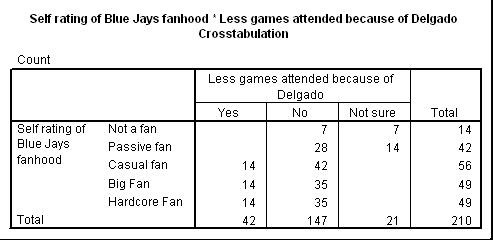

As can be seen in these tables, the impact of Delgado’s departure would be widespread from passive fans through hardcore fans. For attendance purposes, it is important to note that all 42 of the respondents who said would come to less games rate themselves as Casual Fans, Big Fans or Hardcore Fans. The other thing to note is in the third table, all 91 of the respondents who thought that Delgado was of Great Importance or Very Important to the team considered themselves at least passive fans. Therefore, the people who truly value Delgado seem to be people who have had an interest in the Blue Jays and have supported the team.
Although the level of fandom was important for the Jays management, someone could consider themselves a Hardcore Fan without attending many games. Therefore it was important to cross-tabulate the results of fans thinking they’d attend less games with how many games these fans were attending. Again, here is a table displaying these results:
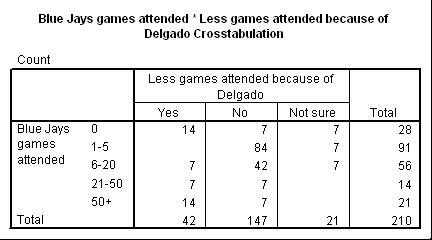
As can be seen in the above table, respondents who claimed to have gone to no games in the last year also claimed that they would attend even less games if Delgado was not part of the team. I believe that these respondents were stating that the chances of them attending a Blue Jays games were even lower if Delgado was not re-signed. The important thing for the Blue Jays management to consider in this table is that two thirds of the respondents who attended more than 50 games last year said that they would attend fewer games this year. The people in that category of attendance are the fans who are at the highest level of the frequency escalator and the Blue Jays should be worried about keeping them there. Therefore it would be discouraging to see that they would attend fewer games and could be a problem for Jays attendance in the next year.
The researcher was wondering if people with a high level of fanhood considered that the product on the field would be of lesser quality without Delgado. The first table presented below, analyzes the loss difference without Delgado with level of fanhood, to see if there is a correlation. Also relevant was if the importance that people put on Delgado had a relationship with the losses, the information for this cross-tabulation is presented in the second table below:
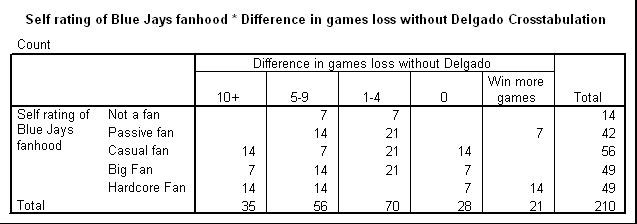

As can be seen in the first table, the level of fanhood does not really affect the perception of the quality of the team on the field. The hardcore fans’ answers varied greatly although over half of them said that the Jays would lose 5 games or more, 42.8% of the fans thought that the Jays win total would not be affected by the presence of Delgado in the lineup or even that the Jays would win more games without him. However it is important to note that the perception is there amongst the Casual to Hardcore Fans that team will lose more games next season without Delgado and therefore may think that the product is of lesser quality. The second table shows that there is definitely a relationship between the amount of importance put onto Delgado and the fans expectations of win total in the next season. The fans that thought he was very important to the team also thought that the team would lose 10 or more games while the fans who thought he was not important thought that the Jays would win more games without him.
Finally, there were two questions at the end of the survey that asked participants to identify if they would attend less Blue Jays games if Delgado was not part of the team and also if they would watch less televised games if he was not part of the team. The answers to these questions truly help understand the exact relationship between Carlos Delgado’s departure and fan attendance & television ratings of televised games. The following graphs identify the fans answers to the questions asked:
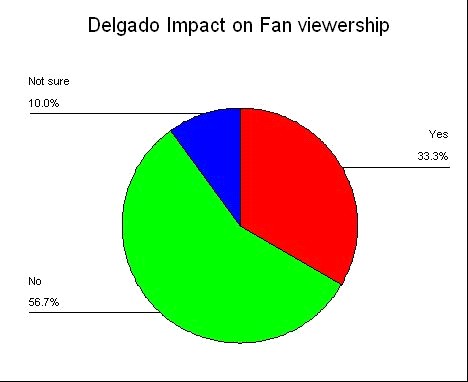
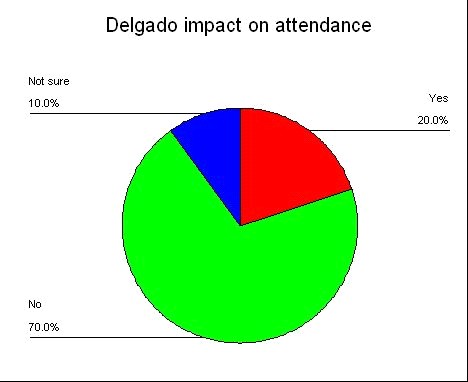
These graphics show that if the Blue Jays were to not re-sign Delgado, it would have an immediate impact on both attendance and fan viewership. Out of the 210 respondents to this survey, a third indicated that if Delgado was not on the team, they would watch less televised Blue Jays games. Also, a fifth of the respondents indicated that they would attend fewer games if Delgado was not part of the Blue Jays. This is a strong indication that if the star first baseman was to leave the team, the Blue Jays finances would suffer because of it.
STATISTICS ANALYSIS
Baseball has and always will be a game where statistics can tell the story of an entire game. Someone who missed the game the previous night can wake up the next morning, read the box score and understand the events of the three hour game. During the 1980s, new types of statistics became popular because of individuals who studied the art of Sabrmetrics, a statistical analysis of baseball named after the Society for American Baseball Research. One of these statistics that was created was a hybrid of some of the Sabrmetrics statistics and was entitled Value Over Replacement Player. Baseball Prospectus (2004) defines this statistic as “The number of runs contributed beyond what a replacement-level player would contribute if given the same percentage of team plate appearances.” Essentially, the statistic is calculated by averaging the performance of all the players at a position and then identifying how much better or worse a player’s performance was as compared to the average.
For the 2004 season, Carlos Delgado’s VORP was 41.4, essentially identifying that Delgado would contribute 41.4 more runs to the Toronto Blue Jays lineup than an average player (Baseball Prospectus, 2004). The impact of losing Delgado would be enormous since the Blue Jays scored 719 runs last season (ESPN.com, 2004). There are currently four legitimate rumours involving the Blue Jays team at the moment; the signings of first baseman John Olerud, third baseman Corey Koskie and relief pitcher Billy Koch along with the trading of starting pitcher Josh Towers and non roster players for starting pitcher Barry Zito (ESPN.com, 2004). For each of these players, I identified the player that they would be replacing on the team; Carlos Delgado, Josh Towers, third baseman Erin Hinske and relief pitcher Kerry Ligtenberg (ESPN.com, 2004). Finally the VORP for all eight players were calculated to identify the difference between the lineup as it stood last year and as it is rumoured to stand this next season, this data, acquire from Baseball Prospectus(2004, is presented in the following table:
As can be seen in the table, the incoming players would increase the run performance of the Blue Jays by 72 while the departing players would decrease it by 48.1 if the 2004 numbers stay the same. This means, that the rumoured changes could benefit the Blue Jays to the tune of almost 24 runs during the following season. Unfortunately, player performance varies from year to year making this an inexact science but it gives a good estimation of how the changes could improve the baseball team.
DISCUSSION
The findings of this survey support the research question alluding to there being a negative correlation between Delgado and attendance. The respondents displayed this by their answer to the question asking them whether they would attend less games if Delgado departed, with 20% saying that they would attend less games. Since the people responding to the survey are package holders, this would increase the amount of tickets available to offer to the public and therefore may negatively affect demand on top of the original decrease in attendance.
These results can be explained by the possible perception of a lesser quality of on-field product because of Delgado’s departure, which was identified in this survey when the respondents were asked about the amount of games that the Jays would lose without Delgado more than if they had him. These findings were also consistent with the findings by Passikoff (1997) who found that fan loyalty could be attributed in part to a bond with a certain player, in this case Carlos Delgado. The decrease that would come in attendance and viewership of games could be a symbol of the decrease in fan loyalty.
Also, this research was also consistent with the findings by Berri, Schmidt, Brook (2004) who found that star power was statistically significant as a factor of fan attendance. My research found that the loss of star power(Delgado) would decrease attendance and that it was therefore a significant factor of Blue Jays attendance. These results suggest that the fan backlash if the Blue Jays were to not retain the services of Carlos Delgado would be strong and that there would be a decrease in fan loyalty.
The second part of the analysis found that Carlos Delgado’s production could be replaced on the Blue Jays roster by making a few changes that would keep them inside their budget. Through strong rumours, there have been reports of 4 roster changes of which none were as financially significant as the cost of signing Carlos Delgado. As analyzed in this research, the changes, if statistically similar to last season’s, would bring positive change to the team and would create a positive influx of runs.
These findings should be shared with the public by Blue Jays management to educate them and also to ease the tension if Delgado is not re-signed and these changes are made. The other part that must be remembered is if Delgado is such an important part of the line-up, an injury to the first baseman could be more devastating than losing him through free agency because the funds would have been spent and production would not be received in return for this expenditure.
CONCLUSION AND RECOMMENDATIONS
As stated, although the departure of Carlos Delgado has been proven to have a negative correlation with attendance at Blue Jays games, his run production could easily be replaced by making roster changes. This goes along with both the hypotheses stated at the beginning of the research. Two big weaknesses of this research was the relatively small sample size and also the use of ticket package holders only, it might not be representative of Blue Jays fans as a whole. Furthermore, in future research, the exact number of lesser games attended should be identified to see a more exact estimation of the effect of a star player’s departure on fan attendance.
As for the management of the Toronto Blue Jays, it is recommended to them that they should educate the public on whatever decisions they take during the winter with the use of the sabrmetrics statistics they use to evaluate players. Interestingly, it was found that some people who responded to this survey actually thought that the Blue Jays would win more games without Delgado, perhaps understanding that the funds would be better spent if spread out amongst other players.
Decisions in sport management often have repercussions on the organization itself and the public as a whole because of media coverage. Hopefully, researches such as this one can help sport managers take more informed decisions about their organizations. However, It is difficult to generalize the findings for all sport managers, even for major league baseball managers, because of the differences in sports, markets and situations.
Dan Julien is a 21-year-old Sport Management Honours student who has worked for the Ottawa Lynx as an intern and in ticket sales. He hopes to build a career in baseball.
His professor is an academic not-for-profit type who doesn't follow sports. That's why he uses only VORP, defining it "so that a two year old would understand it." Note that 30 surveys were collected and the inputs multiplied by seven, so the students wouldn't waste days harassing people and then putting together the results. The main part of the exercise was to build a survey that could test variables and could be well understood.
Thanks for submitting this to Batter's Box, Dan. Continued success with your studies.
Free Agency And Attendance
by Dan Julien
December 7, 2004
One of the difficulties of managing any organization is finding the right people to perform the tasks that need to be completed while not exceeding a budget. On professional sport teams this often involves a general manager making difficult decisions about trades or signings to complete his roster.
This study set out to study the impact that one of these decisions would have on the fans of a sports team. The decision in question was Toronto Blue Jays’ general manager, J.P. Ricciardi choosing to re-sign or not his all star first baseman Carlos Delgado. Although Ricciardi has made it clear that he would like to retain Delgado’s services, his budget for the upcoming season may not allow him to do so.
Carlos Delgado has become a fan favorite because of his length of stay with the franchise and his performance, therefore it would make sense to believe that his departure could negatively affect fan loyalty. The purpose of this survey design was to test the relation between fan attendance and the departure of a star player in Major League Baseball. More accurately, the study wanted to help the Jays understand the impact of the possible departure of their star first baseman will have on attendance and revenues so that they could confidently take a decision on how much he would be worth to the franchise.
The independent variable fan attendance was generally defined as the departure, via free agency, of Carlos Delgado from the Toronto franchise to another franchise within Major League Baseball.) The dependent variable was generally defined as the amount of spectators that will come to Jays games during the 2005 Major League Baseball season.
METHODS
This research was conducted with a survey to collect the information we would like from fans of the Toronto Blue Jays. The decision to go for a survey was two-fold; I wanted to understand the characteristics of our sample as well as obtaining information about their behavior towards the Blue Jays.
To answer the second question of the research I decided to go with archival research into baseball statistics to understand Delgado’s statistical importance to the ball club. To access these statistics, we used the Baseball Prospectus website www.baseballprospectus.com and mainly the “Value Over Replacement Player” (VORP) statistic. According to Baseball Prospectus(2004), VORP is the calculation of a certain player’s importance to the team over a player of replacement level.
The population for our sample was Toronto Blue Jays ticket-package holders, although these people are not the only Jays fans, they are the ones who have made a commitment to the team by purchasing ticket-packages. The Toronto Blue Jays were nice enough to have provided us with list of package holders who had accepted to be contacted by the team and outside sources when signing up for the packages. I only sent surveys to one fifth of the list and will choose these people by random selection.
The first type of information I collected is demographic data; such as age and gender. After, the survey asked respondents questions relating to their level of fandom of the Blue Jays and of baseball in general. Finally, the survey inquired about the fans’ expectations of the Blue Jays if Delgado does depart as a free agent and their resulting purchasing decision. This survey was sent via mail to the respondents’ homes with a self-addressed, postage-paid envelope enclosed.
The object of the first three questions of the survey was to gather personal data about the participants so that they could be classified in demographic groups. The questions numbered 4 through 8 helped gather information about the independent variable, fan behavior. The next two questions, 9 and 10, were to help understand the importance that participants think that Delgado has for the team, to help us understand the effect of the independent variable which is the possible departure of Delgado. Finally, the 11th and 12th questions were asked to measure the effect of the independent variable on the dependent variable by seeing if attendance and television viewership of Blue Jays’ games would decrease as a result of Delgado leaving.
The data collected with the 11th and 12th question has allowed me to measure the estimated impact that Carlos Delgado’s departure would have on the Blue Jays’ attendance. A further study at the end of the season using the attendance data could evaluate this further but this data would be skewed by other factors such as team success and the popularity of baseball in the wake of the National Hockey League lockout. As for the question of Delgado’s statistical significance, as previously mentioned has been dissected with the help of statistics from the Baseball Prospectus website, such as the Value Over Replacement Player. I have examined the value that Delgado has over a replacement level player and then examine what changes the Blue Jays could make with the estimated salary that they would have to pay him that could help make up or even improve the lineup with this change at first base.
To analyze the data, I used the SPSS program, allowing me to input the data and run different tests on it to identify the valued data for the research such as the descriptive statistics that helped shape an understanding of the population characteristics. Also, the program helped me identify other important data such as the connection between level of fanhood and the possible decrease in games watched and attended because of Delgado’s departure. For the statistical significance section, the collection of the VORP statistic was essential and then a review of the players available through free agency and trade rumours involving the Blue Jays was completed through ESPN.com. The players identified were then matched up to the Blue Jays depth chart and the players who they replaced were also identified. The VORP statistics for all players identified roster were then calculated by hand to come up with the data to show the changes that could be made to off-set the departure of the player in question.
RESULTS
SURVEY ANALYSIS
Out of the 500 surveys sent out, 210 respondents completed the survey in its entirety and sent them back to me. The results identified in this section are provided with a margin of error of 10% because of the relatively small sample size at a 95% confidence level.
For this research, there were 210 respondents to the mail survey administered. Of these 210 respondents, half the participants were between the ages of 26-40 while the average age for subjects that completed the survey was 32.90 years of age. As for the question of gender, of the 210 subjects 63.3%, 133 respondents, were male. Below is a bar chart showing the breakdown age breakdown along with a pie chart displaying the gender of subjects:


As for marital status, 40% of the subjects were married while 23.3% were divorced and 16.7% were single. The answers for the self classification of Blue Jay fanhood were varied with the four of the choices over 20%, but the most found answer was “casual fan” of which 26.7% of respondents claimed being. Here is a pie chart that presents this data:

The respondents were overwhelming in their identification Carlos Delgado as being either Important, of Great Importance or Very Important to the Toronto Blue Jays by identifying one of these categories 83.3% of the time. Although this number was staggering and impossible to ignore, only a third of the respondents said that they would watch less games and only 20% claimed that they would attend less games if Carlos Delgado was to depart. Also, fans speculated that the Jays would lose more games than if Delgado was in the line-up next season 76.7% of the times with a third of the total answers being that the Jays would lose 1 to 4 more games. The following is a pie chart identifying fan views on the change in games won without Delgado:

The information reported above is important for the Blue Jays front office to review and I wanted to give them more in-depth information to identify exactly who it was that would attend less games and watch less games on television. Because management would be interested in their top fans, we cross-tabulated the data of Blue Jays fanhood with the answers to the questions about the importance of Carlos Delgado along with the amount of games watched on television and attended less than if Delgado was re-signed. In the following three tables, this data is presented:



As can be seen in these tables, the impact of Delgado’s departure would be widespread from passive fans through hardcore fans. For attendance purposes, it is important to note that all 42 of the respondents who said would come to less games rate themselves as Casual Fans, Big Fans or Hardcore Fans. The other thing to note is in the third table, all 91 of the respondents who thought that Delgado was of Great Importance or Very Important to the team considered themselves at least passive fans. Therefore, the people who truly value Delgado seem to be people who have had an interest in the Blue Jays and have supported the team.
Although the level of fandom was important for the Jays management, someone could consider themselves a Hardcore Fan without attending many games. Therefore it was important to cross-tabulate the results of fans thinking they’d attend less games with how many games these fans were attending. Again, here is a table displaying these results:

As can be seen in the above table, respondents who claimed to have gone to no games in the last year also claimed that they would attend even less games if Delgado was not part of the team. I believe that these respondents were stating that the chances of them attending a Blue Jays games were even lower if Delgado was not re-signed. The important thing for the Blue Jays management to consider in this table is that two thirds of the respondents who attended more than 50 games last year said that they would attend fewer games this year. The people in that category of attendance are the fans who are at the highest level of the frequency escalator and the Blue Jays should be worried about keeping them there. Therefore it would be discouraging to see that they would attend fewer games and could be a problem for Jays attendance in the next year.
The researcher was wondering if people with a high level of fanhood considered that the product on the field would be of lesser quality without Delgado. The first table presented below, analyzes the loss difference without Delgado with level of fanhood, to see if there is a correlation. Also relevant was if the importance that people put on Delgado had a relationship with the losses, the information for this cross-tabulation is presented in the second table below:


As can be seen in the first table, the level of fanhood does not really affect the perception of the quality of the team on the field. The hardcore fans’ answers varied greatly although over half of them said that the Jays would lose 5 games or more, 42.8% of the fans thought that the Jays win total would not be affected by the presence of Delgado in the lineup or even that the Jays would win more games without him. However it is important to note that the perception is there amongst the Casual to Hardcore Fans that team will lose more games next season without Delgado and therefore may think that the product is of lesser quality. The second table shows that there is definitely a relationship between the amount of importance put onto Delgado and the fans expectations of win total in the next season. The fans that thought he was very important to the team also thought that the team would lose 10 or more games while the fans who thought he was not important thought that the Jays would win more games without him.
Finally, there were two questions at the end of the survey that asked participants to identify if they would attend less Blue Jays games if Delgado was not part of the team and also if they would watch less televised games if he was not part of the team. The answers to these questions truly help understand the exact relationship between Carlos Delgado’s departure and fan attendance & television ratings of televised games. The following graphs identify the fans answers to the questions asked:


These graphics show that if the Blue Jays were to not re-sign Delgado, it would have an immediate impact on both attendance and fan viewership. Out of the 210 respondents to this survey, a third indicated that if Delgado was not on the team, they would watch less televised Blue Jays games. Also, a fifth of the respondents indicated that they would attend fewer games if Delgado was not part of the Blue Jays. This is a strong indication that if the star first baseman was to leave the team, the Blue Jays finances would suffer because of it.
STATISTICS ANALYSIS
Baseball has and always will be a game where statistics can tell the story of an entire game. Someone who missed the game the previous night can wake up the next morning, read the box score and understand the events of the three hour game. During the 1980s, new types of statistics became popular because of individuals who studied the art of Sabrmetrics, a statistical analysis of baseball named after the Society for American Baseball Research. One of these statistics that was created was a hybrid of some of the Sabrmetrics statistics and was entitled Value Over Replacement Player. Baseball Prospectus (2004) defines this statistic as “The number of runs contributed beyond what a replacement-level player would contribute if given the same percentage of team plate appearances.” Essentially, the statistic is calculated by averaging the performance of all the players at a position and then identifying how much better or worse a player’s performance was as compared to the average.
For the 2004 season, Carlos Delgado’s VORP was 41.4, essentially identifying that Delgado would contribute 41.4 more runs to the Toronto Blue Jays lineup than an average player (Baseball Prospectus, 2004). The impact of losing Delgado would be enormous since the Blue Jays scored 719 runs last season (ESPN.com, 2004). There are currently four legitimate rumours involving the Blue Jays team at the moment; the signings of first baseman John Olerud, third baseman Corey Koskie and relief pitcher Billy Koch along with the trading of starting pitcher Josh Towers and non roster players for starting pitcher Barry Zito (ESPN.com, 2004). For each of these players, I identified the player that they would be replacing on the team; Carlos Delgado, Josh Towers, third baseman Erin Hinske and relief pitcher Kerry Ligtenberg (ESPN.com, 2004). Finally the VORP for all eight players were calculated to identify the difference between the lineup as it stood last year and as it is rumoured to stand this next season, this data, acquire from Baseball Prospectus(2004, is presented in the following table:
Player 2004 VORP Player 2004 VORP
Carlos Delgado 41.4 John Olerud 7.5
Josh Towers 10.5 Barry Zito 31.5
Eric Hinske -2.2 Corey Koskie 26.7
Kerry Ligtenberg -1.6 Billy Koch 6.3
Total 48.1 Total 72
As can be seen in the table, the incoming players would increase the run performance of the Blue Jays by 72 while the departing players would decrease it by 48.1 if the 2004 numbers stay the same. This means, that the rumoured changes could benefit the Blue Jays to the tune of almost 24 runs during the following season. Unfortunately, player performance varies from year to year making this an inexact science but it gives a good estimation of how the changes could improve the baseball team.
DISCUSSION
The findings of this survey support the research question alluding to there being a negative correlation between Delgado and attendance. The respondents displayed this by their answer to the question asking them whether they would attend less games if Delgado departed, with 20% saying that they would attend less games. Since the people responding to the survey are package holders, this would increase the amount of tickets available to offer to the public and therefore may negatively affect demand on top of the original decrease in attendance.
These results can be explained by the possible perception of a lesser quality of on-field product because of Delgado’s departure, which was identified in this survey when the respondents were asked about the amount of games that the Jays would lose without Delgado more than if they had him. These findings were also consistent with the findings by Passikoff (1997) who found that fan loyalty could be attributed in part to a bond with a certain player, in this case Carlos Delgado. The decrease that would come in attendance and viewership of games could be a symbol of the decrease in fan loyalty.
Also, this research was also consistent with the findings by Berri, Schmidt, Brook (2004) who found that star power was statistically significant as a factor of fan attendance. My research found that the loss of star power(Delgado) would decrease attendance and that it was therefore a significant factor of Blue Jays attendance. These results suggest that the fan backlash if the Blue Jays were to not retain the services of Carlos Delgado would be strong and that there would be a decrease in fan loyalty.
The second part of the analysis found that Carlos Delgado’s production could be replaced on the Blue Jays roster by making a few changes that would keep them inside their budget. Through strong rumours, there have been reports of 4 roster changes of which none were as financially significant as the cost of signing Carlos Delgado. As analyzed in this research, the changes, if statistically similar to last season’s, would bring positive change to the team and would create a positive influx of runs.
These findings should be shared with the public by Blue Jays management to educate them and also to ease the tension if Delgado is not re-signed and these changes are made. The other part that must be remembered is if Delgado is such an important part of the line-up, an injury to the first baseman could be more devastating than losing him through free agency because the funds would have been spent and production would not be received in return for this expenditure.
CONCLUSION AND RECOMMENDATIONS
As stated, although the departure of Carlos Delgado has been proven to have a negative correlation with attendance at Blue Jays games, his run production could easily be replaced by making roster changes. This goes along with both the hypotheses stated at the beginning of the research. Two big weaknesses of this research was the relatively small sample size and also the use of ticket package holders only, it might not be representative of Blue Jays fans as a whole. Furthermore, in future research, the exact number of lesser games attended should be identified to see a more exact estimation of the effect of a star player’s departure on fan attendance.
As for the management of the Toronto Blue Jays, it is recommended to them that they should educate the public on whatever decisions they take during the winter with the use of the sabrmetrics statistics they use to evaluate players. Interestingly, it was found that some people who responded to this survey actually thought that the Blue Jays would win more games without Delgado, perhaps understanding that the funds would be better spent if spread out amongst other players.
Decisions in sport management often have repercussions on the organization itself and the public as a whole because of media coverage. Hopefully, researches such as this one can help sport managers take more informed decisions about their organizations. However, It is difficult to generalize the findings for all sport managers, even for major league baseball managers, because of the differences in sports, markets and situations.
Dan Julien is a 21-year-old Sport Management Honours student who has worked for the Ottawa Lynx as an intern and in ticket sales. He hopes to build a career in baseball.




